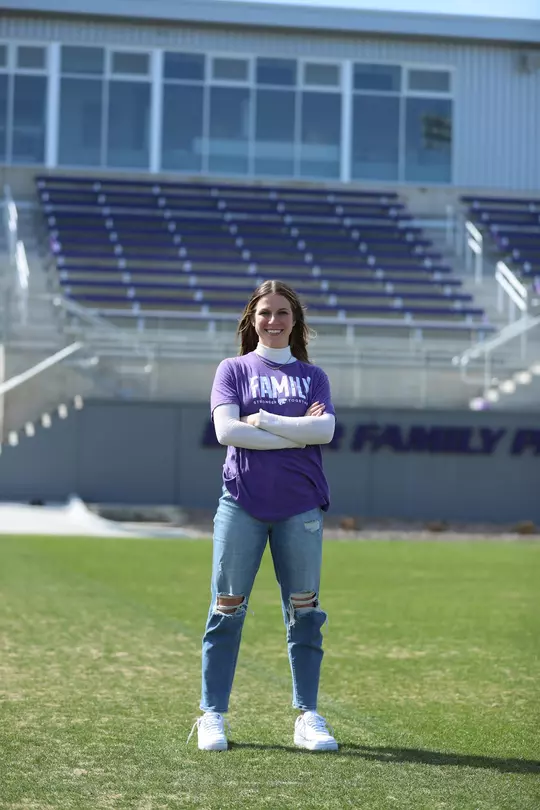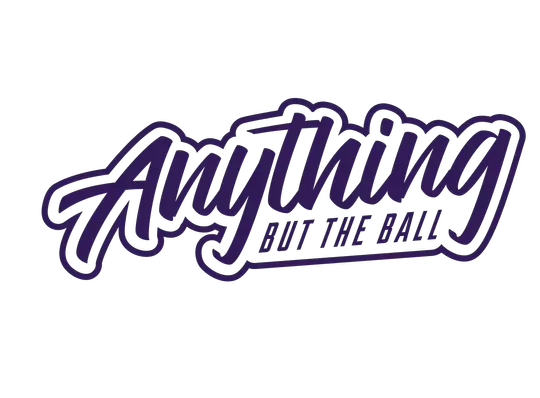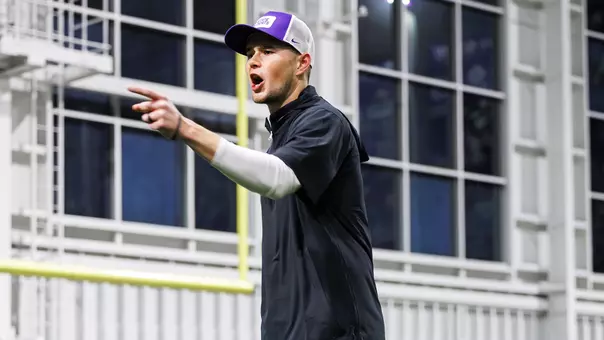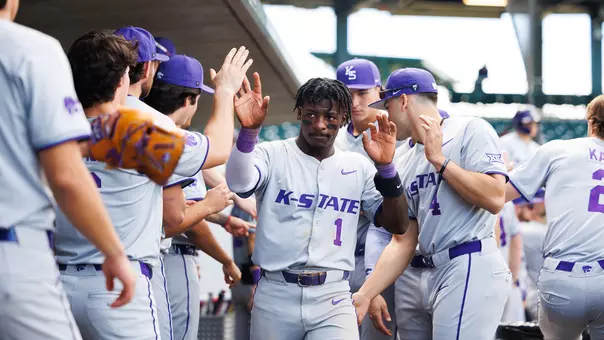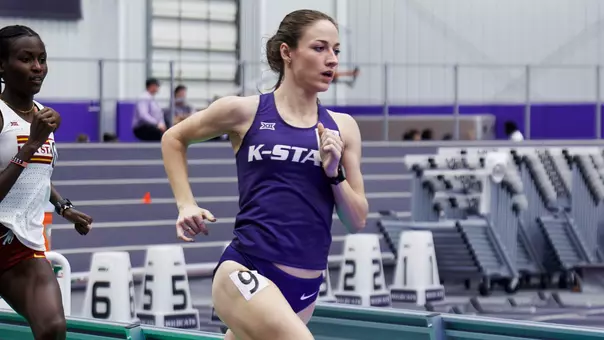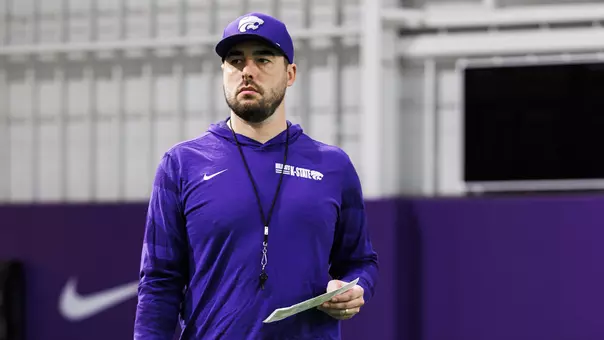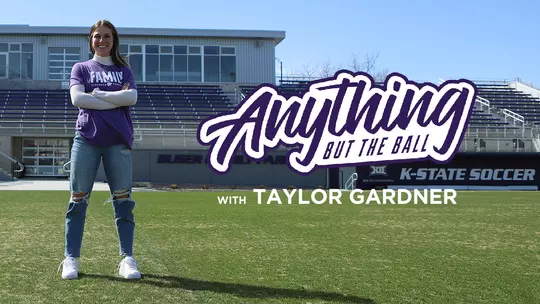
Anything But the Ball: Mental Health with Taylor Gardner
3/30/2021
Our first “Anything but the Ball” conversation is with Taylor Gardner, a junior on the K-State Soccer team. Taylor helped lead Mental Health Awareness Week at K-State Athletics, joining other Big 12 schools in creating videos that gave student-athletes an opportunity to share their mental health journey.
Taylor is also a member of K-State & Big 12 SAAC (Student-Athlete Advisory Committee), works at the No Stone Unturned Foundation in Manhattan and volunteers with Big Brothers & Big Sisters of Riley County. She is a Business Administration major at Kansas State.
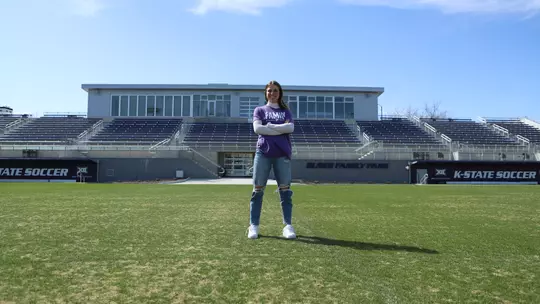
Austin Siegel: Why get involved in Mental Health Awareness Week here at K-State?
Taylor Gardner: Mental health is something that’s huge to me. I’ve recently had a lot of mental health struggles with depression and anxiety, and before I got to college it was something that I knew nothing about and had no awareness about. I thought it was something in movies that didn’t have to do with my life.
It was like, “Oh, athletics is hard, school is hard and you’re really busy,” but it was something I couldn’t handle on my own. I needed help. So, I reached out to (K-State Director of Mental Wellness) Anne (Weese) and received help from her and our doctors. I’m in a much better place now and I wouldn’t be here without them. I just want people to know that’s it’s OK to reach out for help. A lot of times we can’t do it by ourselves. In athletics, there is such a stigma of, “I can’t be anything but perfect.” We’re such driven and disciplined individuals that we don’t want to fail. We see not being OK as failure and I just want people to know that’s not the case. From my own personal experience, that’s definitely not the case.
That’s why it’s so important to me and that’s why I partnered with Anne to put stuff out there and create these videos.
There is nothing wrong with asking for help @WildcatTough x #Big12BreaksTheStigma pic.twitter.com/tei0trAri6
— K-State Athletics (@kstatesports) February 23, 2021
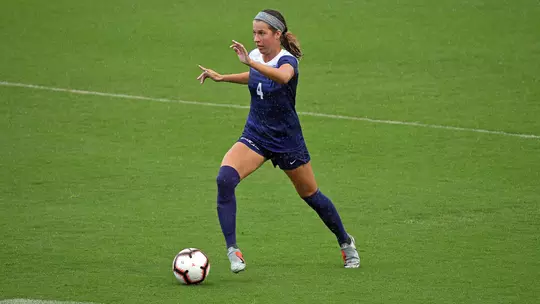
AS: It was pretty remarkable how many different people were involved in that project across all the different teams in Manhattan. For you specifically, what helped you become comfortable talking about mental health and wearing it on your sleeve?
TG: It’s definitely kind of taboo and it was hard to open up about it at first. I didn’t want to have those uncomfortable conversations with people about what their mental health looked like. But I’ve come to realize that being OK sharing my story opens doors for a lot of people to talk to me about it. If I went through it, just so somebody else can be OK talking about it and find help, then that’s awesome. Let’s talk about it, let’s get it all out in the open.
It’s not always comfortable and it’s hard to get into the conversation, but once you’re in, that can really open a lot of doors. I think just getting past that initial step of, “OK, this isn’t going to be the most comfortable thing, but it needs to be talked about,” that’s the most important thing.
AS: It definitely feels like something, at least for me, that can feel so personal and isolating when you’re going through it, but when you see people talking about it or you have those conversations, that kind of turns the light on and the monster doesn’t feel so specific to you.
What has been your reaction to seeing those videos that we talked about and having those conversations? What has that done for you?
TG: It’s definitely made me feel not so alone in it. I think since it’s not so talked about, often times it can feel like I’m the only one going through it and everyone else is so happy.
This is a whole different conversation, but in social media we’re seeing all these perfect pictures. Seeing that every day, it can feel like, “I’m the only one who’s not OK.” When you see these videos about people talking about their mental health and having these conversations, it really makes you feel a lot more OK with where you’re at. People have gone through this, people are going through this and I’m not alone.
I’ve come to realize that being OK sharing my story opens doors for a lot of people to talk to me about it. If I went through it, just so somebody else can be OK talking about it and find help, then that’s awesome. Let’s talk about it, let’s get it all out in the open.Taylor Gardner
AS: You said something earlier about your journey with this - it definitely seems like college was kind of a turning point. I think that’s interesting because when you get to a college campus, there are so many resources out there, but they’re not always front and center. Sometimes you have to be the one to take that first step.
Especially for student-athletes, you talked about Anne and how she’s been such a positive influence on so many people, but what would your advice be for a student-athlete who gets to K-State and knows they want to tackle this, but isn’t really sure where to start?
TG: Anne has been the biggest resource for me. She’s super busy and I feel like sometimes people are like, “Oh, I don’t want to bother her, she’s got to help every other student-athlete.” But she will make time for anyone and for anything.
My freshman year, first semester, I started meeting with her. Honestly, I think I would have lost it if I didn’t have her. I would definitely tell any student-athlete first of all, reach out to Anne and have a conversation with her. Your coaches are there to support you. Some people don’t want to talk to their coaches about mental health and about not being OK because they don’t want it to cause issues on the field, but they are your support staff and they’re here to help too.
There are also resources on campus that aren’t utilized as much by us as they probably should be, but that’s always another option you can reach out to, especially if you want someone not involved in athletics and a whole step out of that.
AS: Does she talk to athletes when they first get to campus? How is that office introduced to you guys when you’re a freshman here at K-State?
TG: She comes and talks to our team and introduces herself to all the new girls, that’s the first time we see her. She comes and talks to our team periodically about different stuff with sports performance. But the first time she introduces herself she’s like, “OK, here’s how you contact me, my office is always open.” That’s how we get in the door. You can text, message her, use or Teamworks or anything. She’ll reply to you.
AS: I think there’s a bit of a distinction that Anne has made, at least when we’ve talked, about the different between sports psychology and mental wellness. That’s a big one, especially because it doesn’t always seem so obvious to me. How have you experienced the difference between those conversations about sports psychology vs. mental wellness?
TG: They’re definitely two polar opposite conversations. I did a lot more sports performance stuff with Anne during my freshman year, with my anxiety – that’s affecting my play, so how can we get over that? The other conversations are a lot more personal and they’re hitting a lot of stuff. We might not even talk about soccer at all during those conversations. It’s just like, “What’s going on in your life? What’s causing these issues? How can we move forward?”
Those conversations are a lot deeper and have helped a lot more. Her sports performance is great, but from what I’ve experienced, really tackling my mental health problems helped a lot with my performance issues as well. So, they kind of go hand-in-hand, but they look really different when they’re happening. I really appreciate that she can do both sides of that and tackle it all in one place.
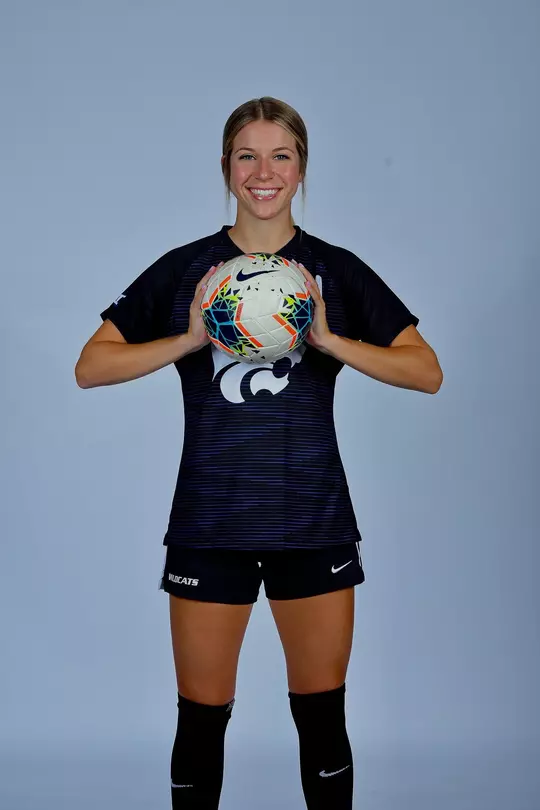
AS: That different between sports performance and mental health dovetails nicely into something I wanted to ask you about: You had to step away from soccer recently, and I feel like that could be a decision that affects you in a lot of different ways, including mental health. But first of all, how has that been going? What’s that experience been like so far?
TG: So, I decided in January to medically retire from soccer. Honestly, it’s been a decision that’s been weighing on me for a long time because I’ve had three hip surgeries. I really haven’t been without pain since I got to school. It was something where I tried and tried and tried to perform my best and be there for the team. It was a lot more than I can handle and I decided to step away from it. I’m still on the team, I’m there encouraging them, I’ve stepped up helping Kat [Benton-LaEzza] direct our community service and finding different roles for me.
I’m in such a good place with my decision. It’s taken a lot of stress off my shoulders of like, “OK, when can I get back and be fully there with my team?” Well, I don’t know if that was ever going to happen. I want to live a life where I can run in 10 years, so it was just long-term health decisions. Also, right now, mentally I’m in much a better place than I ever have been, because I don’t have that stressor of, “Oh, I’m not good enough.” Well, I physically can’t perform my best. That was really hard to battle through. I’m really glad about the decision I’ve made and the support that I’ve gotten from [Coach] Dibbini and everyone, how he’s allowed me to stay on with the team has been awesome. It was a really hard decision but I’m really glad I made it.
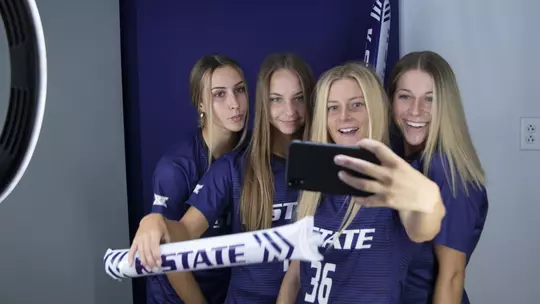
AS: I was going to say, I think one of the interesting things about soccer – having gone to a lot of your games this year at Buser Family Park – is that doesn’t always seem like a sport where the bench would be locked in and super engaged. But you guys are always dancing and messing around.
I remember this one video, I think it was from like Senior Night, where Alec just had a close up your face, do you know the one I’m talking about? It was like so obvious that you were living and dying with every part of that match. Where does that connection come from, because I feel like it would have to be bigger than soccer at a certain point?
TG: Definitely, it’s just the girls. I would do anything for them. This might sound cheesy, but my love for K-State is so deep. My parents both went here, and they always preached the family aspect to me. I’m so committed to this school and this community. I work at No Stone Unturned in the community, and I’ve just really gotten to know how great this place is. My love for K-State and Manhattan runs so deep. I want success for every part of this community and the soccer team is where my heart is right now.
If I can’t perform on the field, then put me on the bench and I lose my voice after every game. I love being a source of energy for the girls like, “OK things aren’t really going our way? Well, let’s return that energy, pick it up,” and just really let them know that they’re supported. I’m passionate about being a good encourager for them even if I can’t do anything else.
Cut the cameras ??#KStateSOC x Senior Night pic.twitter.com/oY3MXXLdzm
— K-State Soccer (@KStateSOC) November 14, 2020
AS: What’s No Stone Unturned?
TG: No Stone Unturned is a therapy center for kids with disabilities. We do collaborative care with four different types of therapy – physical, occupational, behavioral and speech. I work on the foundational side of it, so I help raise funds, my real title is Executive Assistant so it’s about whatever the Executive Director needs. I’m so passionate about it, I could go on for an hour about everything they do. I used to volunteer for them and that’s how I got my job. So, it’s technically not community service. But that’s what I’m out there doing.
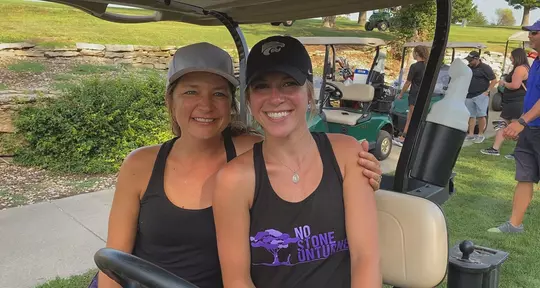
AS: Getting back to soccer for a second, and I’m just ripping from my own experience now, but it feels so relevant because in life you have these anchors and these outlets that are there for you every single day. For some people it can be meditation, drinking coffee, working out, but for a lot of athletes at K-State I can imagine that their sport is that anchor or outlet.
I know it’s just been a few weeks since you officially stepped away, but as you make that transition from soccer, what have some of your experiences been like?
TG: It was really hard at the first couple of practices I went to because I used to sit out of practices hurt, knowing that I would come back some day. Those first couple of practices I was like, “Wow, I will truly never do this again at this level.” That was really hard to adjust to. Honestly, I’ve found a new outlet in my faith and just taking time every day to invest in that. For me, it’s reading my bible, praying and really growing in that. So that’s been my new outlet.
It’s definitely different. I’m still working out at the Rec and feel kind of crazy for maxing out at squats like Cav (Danny Cavender) would have us do. I can’t let that part of it go yet. There are definitely different outlets for different stuff, but I would say my main one right now is my faith. That’s what has gotten me through all of this and my life looking so different now. Just knowing that my identity doesn’t rest in soccer. It was a great part of my life and it was awesome, but I’m so excited about what I’m going to do in my future that it hasn’t been super hard to step away from.
Heard it was international cats day, so of course I had to bring out my favorite video in my camera roll #gocats (s/o @handlin12 for being the best video guy out there) pic.twitter.com/z0ex6bci91
— tg (@taylorgardnerr) August 8, 2020
AS: It occurred to me that making that transition is something that 99.9 percent of student-athletes are going to have to experience and tackle one day. The fact that you’re still so clearly involved in this community, what advice would you have for student-athletes?
TG: I would encourage student-athletes to know that who they are is not rooted in their sport. Whether you’re a believer or not, just know that there is so much more than that. They’re a friend, a daughter, a son. You are not defined by your sport, and I think we put so much time into it that it’s hard to remember that because it is our lives right now. Most of us do get paid to do it through scholarships. It can make it really hard to step away if that’s who you think you are. I know everyone doing a sport here and everywhere is so much more than that. I think every student-athlete should hold on to that and remember that when it’s time to step away.
AS: So now that you’re just coming off working on Mental Health Awareness Week, what sort of was your motivation for staying involved in the student-athlete community? You guys play something like 18 games a year but there are almost 365 days that you’re spending together. What made you want to stay involved in that role?
TG: I’m also involved in K-State SAAC, and then I’m in the Big 12 SAAC as well. Just having that role in Big 12 SAAC has made me want to stay involved because I love what we’re doing at that level and we’re really working on different initiatives. I’m on the Mental Health committee in Big 12 SAAC. Being around student-athletes and the determination and drive that all student-athletes have, that’s just the people I want to surround myself with and grow with. It’s been really cool to be part of both of those organizations, stay involved with student-athletes and keep pushing the initiative to increase mental health awareness around the whole Big 12.
AS: I know Mental Health Awareness Week was happening at all Big 12 schools. What was your favorite part of those conversations on the Big 12 SACC Mental Health committee?
TG: It’s been a little harder with COVID, we haven’t really gotten to meet as much as we would like. I didn’t get to meet them in person like we usually would have in July. We really had this awesome idea that we haven’t gotten to put into place yet. We want to get sports psychologists from different schools and have them come together for roundtables that all the member schools can be on at one time. That’s still in the works. I know that the Big 12 sports psychologists do roundtables already, but we want to do it with student-athletes, getting them involved in those roundtables and letting them know that those are resources at their own school that they can have. I think every school but TCU has a sports psychologist in their athletic department. Just like we talked about, they’re really busy people, but I don’t know that they’re always utilized by everyone in the way that they should be. We’re really working on bringing that to the table right now.
AS: Just to wrap up, I know we talked about Anne and the work that she does, but are there any other resources you want to mention for student-athletes that are really relevant?
TG: I don’t really know of anything off the top of my head, but just making sure that you are reaching out to someone if something is not going well. It doesn’t have to be a professional, but just telling anyone about your struggles is a weight off your shoulders. Just know that you’re not alone. It’s OK not to be OK and to be open about it.
